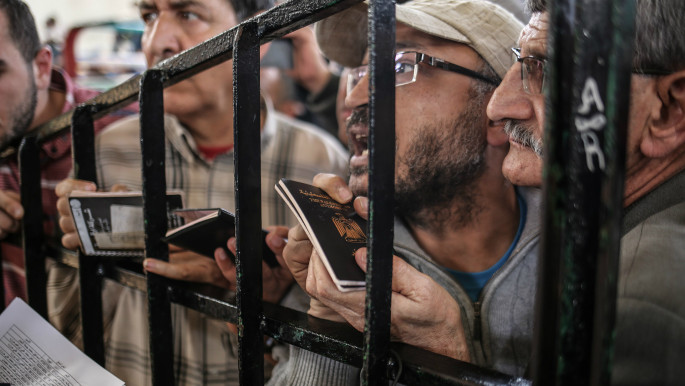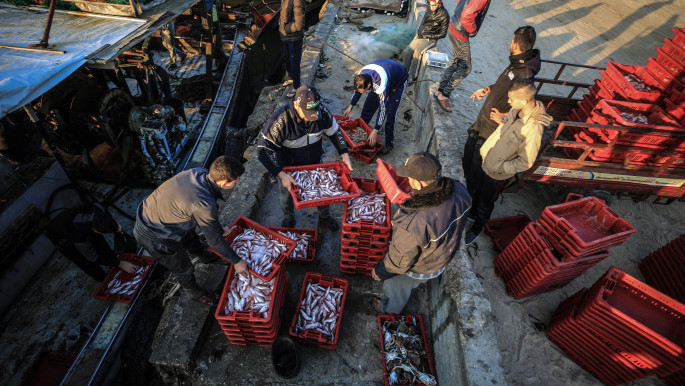Israel's expansion of Gaza's fishing zone is nothing more than a nominal gesture
In early April, Israel announced a pack of unilateral improvement measures, aimed at easing the decade-long blockade on the Gaza Strip, as part of a ceasefire agreement with the ruling authority in Gaza; Hamas.
One of the most widely celebrated of those measures, in Israel and Palestinian media, was the official loosening of Israel's naval siege with an unprecedented expansion of Gaza's fishing zone to 15 miles –the maximal range allowed in Gaza since the signing of the Oslo Accords in 1993.
According to the Israeli Coordinator of Government Activities in the Territories, COGAT, this fishing range expansion is meant as a "civilian policy to prevent humanitarian deterioration in the Gaza Strip, and policy that distinguishes between terrorism and the uninvolved population."
However, to the dismay of Gaza's immiserated fishermen community, the implementation of such move was largely disappointing, as many complained that the devil was lying in the details.
The head of Gaza's fishermen union, Zakaria Bakr, told The New Arab that "we were shocked when we learned the details of this Israeli decision... it's an entirely unpractical move made only for media consumption, at best. There's no improvement here whatsoever."
Zakaria illustrated a long list of problems, obstructions and threats that render such move as "redundant" and "empty," blaming the Israeli COGAT for "disseminating false news and misleading pictures to boast that they care about us, while in reality, they do everything possible to make our job impossible."
 |
|
| Read also: 'Staring at freedom a footstep away': How Gazans struggle to leave through the Rafah border |
The first and main grievance Zakaria expressed to The New Arab was how the blockade devalued this measure and made the fishing range expansion "meaningless and doesn't change anything in our daily struggle to make ends meet." Zakaria further explained that "until today, Israel refuses to allow any necessary fishing equipment, fishing boats or even fiberglass into the Gaza Strip, as part of its long list of banned 'dual-use' items. We can't import anything except for plastic wires to make fishing nets."
Gazan fisherman, Hassan Zidan, told The New Arab that "to venture out into to the edges of the 15 miles zone, we need advance equipment, bigger boats and reliable GPS systems, but we can't get any of this."
Haniya further complained, "Our boats are older than Israel's blockade; the engines, navigation systems and fishing nets are all weary and we even can't import the necessary tools to fix them."
Making things worse, Zakaria said that Israel strictly specified what kinds of boats were allowed to sail into the expanded fishing zone; confining the permissible boats to small ones instead of large and equipped ships, which Gazan fishermen have very few of.
 |
Under Israel's blockade we've become the most oppressed, abused and bullied spectrum of society. They are trying to drive us to complete despair and hopelessness, but we will nonetheless continue to struggle to preserve this heritage |  |
Furthermore, Zakaria pointed out that the 15 miles expansion is limited to a small part of Gaza's coast, namely the southern part that neighbours Egypt, whereas the larger northern fishing zone near Israel's borders is still strictly limited to six miles. Zakaria cynically fumed over the ambiguity of the map given to the fishermen union by Israel's COGAT office, saying that "it requires a surveying engineer to decipher and cannot be decoded by simple fishermen who lack basic GPS navigation tools due to the blockade."
Even in the pre-specified limited fishing zone, Zakaria complained that Gazan fishermen are still prone to regular provocations by the Israeli navy forces, which include kidnapping and arbitrary arrests, spraying fishermen with skunk water and even confiscating or shooting at their boats.
"The Israeli navy are always likely to invade our fishing zone anytime at free will." Zakaria further expressed his distress that after this latest fishing range expansion, "the number of the Israeli navy ambushes and traps has been increasing, and without proper navigation tools, we cannot avoid them."
 |
|
| The Israeli blockade on Gaza's economy has dramatically diminished the purchasing power in the Gaza Strip [Getty] |
Another Gazan fisherman, Ibrahim Haniya, told The New Arab: "Almost everyday we receive news about some of our friends in the sea coming under Israeli shelling or being sprayed with sunk water or fired at. Only a few days ago, the Egyptians arrested four fishermen, and the week before Israel confiscated five fishing boats.
"The blockade and the Israeli navy have turned our profession into a suicidal pursuit," he added.
 |
In Gaza, fish is a luxury that most people cannot afford to buy, as 80% of Gaza's population is dependent on food aid |  |
Moreover, Zakaria expressed his fury over the devastating impact of the 12-year-old Israeli blockade on Gaza's economy, which has dramatically diminished the purchasing power in the Gaza Strip and put their trade in critical danger.
"Even if we suppose a fisherman manages to collect a large sum of fish, and return with it safely to Gaza, there would be almost no one to buy them," Bakr told The New Arab.
"In Gaza, fish is a luxury that most people cannot afford to buy," as 80 percent of Gaza's population is dependent on food aid.
This dead end, as Bakr explained, is further exacerbated by a wide range of strict Israeli restrictions on Gazan exports that make it virtually impossible to export such production to the world outside or even to the West Bank.
With this combination of worrying obstacles and threats, along with what Zakaria described as "terrible weather" over the last days, saying that "ever since the expansion, Gazan fishermen have not sailed past the 15 miles area."
Mohammed Miqdad, another fisherman adds: "We inherited this profession from our parents for generations... But under Israel's blockade we've become the most oppressed, abused and bullied spectrum of society. They are trying to drive us to complete despair and hopelessness, but we will nonetheless continue to struggle to preserve this heritage."
Muhammad Shehada is a writer and civil society activist from the Gaza Strip and a student of Development Studies at Lund University, Sweden. He was the PR officer for the Gaza office of the Euro-Med Monitor for Human Rights.





 Follow the Middle East's top stories in English at The New Arab on Google News
Follow the Middle East's top stories in English at The New Arab on Google News


